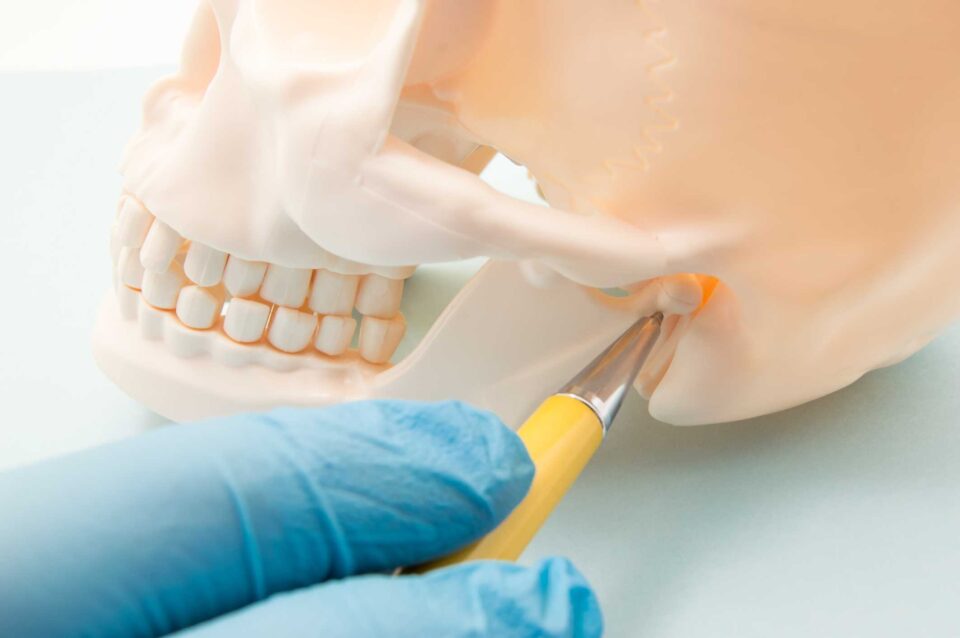TMJ Treatment
Expert TMJ Treatment in McAllen, TX
TMJ, or temporomandibular joint disorder, can cause painful and uncomfortable symptoms that affect your ability to sleep, work, eat, and enjoy life. Undergoing TMJ treatment can help restore your quality of life and reduce painful symptoms. At Xpress Dental, we can determine the extent of your TMJ symptoms and find a safe, effective solution that relieves pain, restores jaw function and range of motion, and enhances your overall health and quality of life. Our TMJ specialist, Dr. John Tan, can provide an official diagnosis of TMJ disorder and design a personalized plan for TMJ treatment in McAllen, TX.

What Is TMJ Disorder?
Temporomandibular joint disorder is a condition that affects the jaw joints and surrounding ligaments, tendons, and muscles. TMJ disorder can cause intense pain, jaw stiffness, pain when chewing or speaking, difficulty eating or opening your mouth, inflammation, headaches, and other symptoms. You have two temporomandibular joints on each side of your face that connect your lower jaw to your skull and allow you to speak, eat, and chew. When these joints become inflamed, injured, or degraded, you will develop symptoms associated with TMJ disorder.
What Causes TMJ Disorder?
It can be hard to pinpoint the underlying cause of TMJ disorder. In some cases, there may be multiple causes. The most common causes of TMJ are:
- Jaw trauma or injury
- Bruxism (teeth grinding or clenching of the jaw)
- Arthritis of the jaw joint
- Severe malocclusion
- Stress or anxiety
- Underlying conditions that affect the health or strength of the jawbone
Recognizing TMJ Disorder Symptoms
While some people don’t experience any TMJ disorder symptoms or only have mild symptoms, others may have severe or widely varied symptoms. The most common TMJ disorder symptoms are:
- Jaw pain and tenderness
- Increased pain when you yawn, open and close your mouth, chew, or speak
- Facial pain and tenderness
- Swelling or inflammation of the face and/or jaw
- Shoulder or neck pain or tenderness
- Jaw stiffness and loss of range of motion
- Trouble opening and closing your mouth
- A popping or clicking noise in the jaw
- Headaches or migraines
- Earaches
- Toothaches
- Ringing in the ears
- Malocclusion
When Should You Visit a TMJ Specialist?
TMJ disorder can cause complications that affect your quality of life. Without TMJ treatment, you may experience chronic pain, chronic stiffness or loss of range of motion, dental wear and tear, permanent malocclusion, and limited chewing function. Visiting a TMJ specialist will allow you to understand the extent of your TMJ disorder and how to alleviate symptoms and prevent further damage. We recommend that you visit Dr. Tan if you have symptoms that have lasted longer than a month, are increasing in severity or duration, or are interfering with your ability to sleep, work, or participate in daily activities.
Exploring TMJ Treatment Options
Dr. Tan and his team will help you understand and explore all of your TMJ treatment options. We will perform a comprehensive exam to assess the extent of your TMJ disorder and symptoms. We will complete a physical exam and take digital x-rays and other diagnostic imaging tests. The most effective TMJ treatment options are:
- Medication—Medication can temporarily relieve uncomfortable TMJ symptoms like pain, stiffness, and inflammation. We may recommend over-the-counter pain medication, muscle relaxers, or antidepressants.
- Lifestyle Changes – Making certain lifestyle changes can reduce your symptoms. We may suggest improving your posture, changing your diet, and adjusting your sleep position and sleep habits.
- Mouth Guards – Custom mouth guards can prevent teeth grinding and jaw clenching while you sleep. They can also improve the position of your jaw during sleep and alleviate stress, pain, and discomfort.
- Physical Therapy – Undergoing physical therapy can relieve pain, strengthen the jaw muscles, and improve the range of motion of your jaw.
- Non-Surgical Treatment Options – We can also explore other non-surgical treatment options. We may recommend ultrasound therapy, trigger point injections, prescription medication, or transcutaneous electrical nerve stimulation therapy.
- Surgical Treatment Options – If conservative treatments are ineffective or you have severe TMJ disorder, we may recommend surgical intervention. The most common surgical options for TMJ disorder are arthrocentesis, TMJ arthroscopy, or open-joint surgery.
Schedule a Consultation for TMJ Treatment
If you’re suffering from TMJ disorder symptoms in McAllen, TX, Dr. Tan and our team at Xpress Dental can help. Call us today or contact us online to schedule a consultation for TMJ treatment. We will perform an exam and diagnostic imaging to provide an official diagnosis of TMJ disorder. We can then design a personalized TMJ treatment plan to relieve pain, improve range of motion and function, and reduce symptoms.
